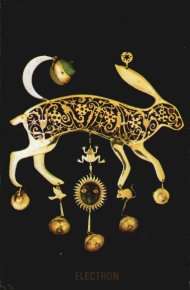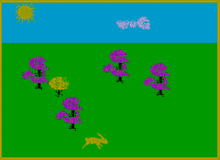Hareraiser
| Hareraiser | |
|---|---|
 Acorn Electron Box art | |
| Publisher(s) | Haresoft |
| Platform(s) | Acorn Electron, Amstrad CPC, BBC Micro, Commodore 64, Commodore VIC-20, Dragon 32, MSX, Oric Atmos, ZX Spectrum |
| Release date(s) | 1984 |
| Genre(s) | Adventure |
| Mode(s) | Single player |
Hareraiser is a computer game, originally released in 1984 in the UK for most home computer platforms. It was released in two parts; Prelude and Finale. A prize worth £30,000 was on offer if the game could be solved.
Gameplay

The game takes the form of a series of graphical screens depicting grass, sky and trees with occasional text 'clues'. The only interaction is pressing the cursor keys to follow a hare which moves across the screen and disappears off one of the sides.
There are no hints as to how the puzzle can be solved but it may be the case that the text and the position of the trees, sun, clouds and other elements (which are different on each screen) can be interpreted in some way. The solvers of Prelude would also then have to buy and solve Finale. They could then enter a competition to locate the prize, the bejewelled 18 carat "Golden Hare" pendant featured on the cover.
Background
The golden hare had previously been the prize for solving the book Masquerade, by the British artist Kit Williams.[1] It had been buried at a secret location (Ampthill Park in Bedfordshire), the object of the game being to solve the clues in the book that would lead the successful treasure-hunter to this location and the golden prize. Several sources state, erroneously, that Hareraiser is based on Masquerade - in fact, the only thing apart from the prize that the two have in common is that both feature a hare.
Haresoft was founded by Dugald Thompson, the controversial winner of Masquerade, and his business partner John Guard.[2]
Release and critical reception
The game was released on Acorn Electron, Amstrad CPC, BBC Micro Model B, Commodore 64, Commodore VIC-20 EX, Dragon 32, MSX, Oric Atmos 48k and Sinclair ZX Spectrum in 1984 at £8.95 for each part.[3] Haresoft claimed the game was released in two parts "To make it fun and enable competitors of all ages to participate".[4] Sinclair User however suggested it was simply to make more money.[4]
The game was awarded 3/10 in Sinclair User with reviewer Richard Price struggling to find any reason to play the game except "the sincere need to get rich".[5]
Haresoft continued to promote the game by sending 'prolific' press releases including stating that an additional clue had been revealed in Harrods by TV personality Anneka Rice.[4] The nature of the clue remains unknown, as does whether or not Ms. Rice was aware that she had revealed such a clue.
Legacy
The game did not sell well and Haresoft went into liquidation. Hareraiser was never solved, and the hare was sold at a Sotheby's auction by the creditors in 1988. Although only given a guide price of £3,000-6,000,[6] it did in fact exceed Haresoft's stated value, selling for £31,900.[2] Although it was rumoured to have been sold again in the early 90s, its whereabouts were unknown for over 20 years until July 2009 when an appeal was made on BBC Radio 4. The current owner's granddaughter got in touch and Kit Williams was reunited with the hare for a BBC TV documentary.[7]
It is possible to download copies of some of the versions of Prelude and Finale, and play them using emulators.
References
- ↑ "Play to Win" in Retro Gamer, Issue 17
- 1 2 "Masquerade & the Mysteries of Kit Williams FAQ" at bunnyears.net, accessed 3 May 2009
- ↑ Original advertisement for the game
- 1 2 3 "Gremlin". Sinclair User. January 1985.
- ↑ "Business not pleasure". Sinclair User. December 1984.
- ↑ "The Masquerade Hare" in Sotheby's auction catalogue, 5 December 1988
- ↑ "Artist reunited with golden hare" by Torin Douglas, BBC News, 20 August 2009
External links
- Hareraiser at Lemon 64
- Haresoft at Acorn Electron World